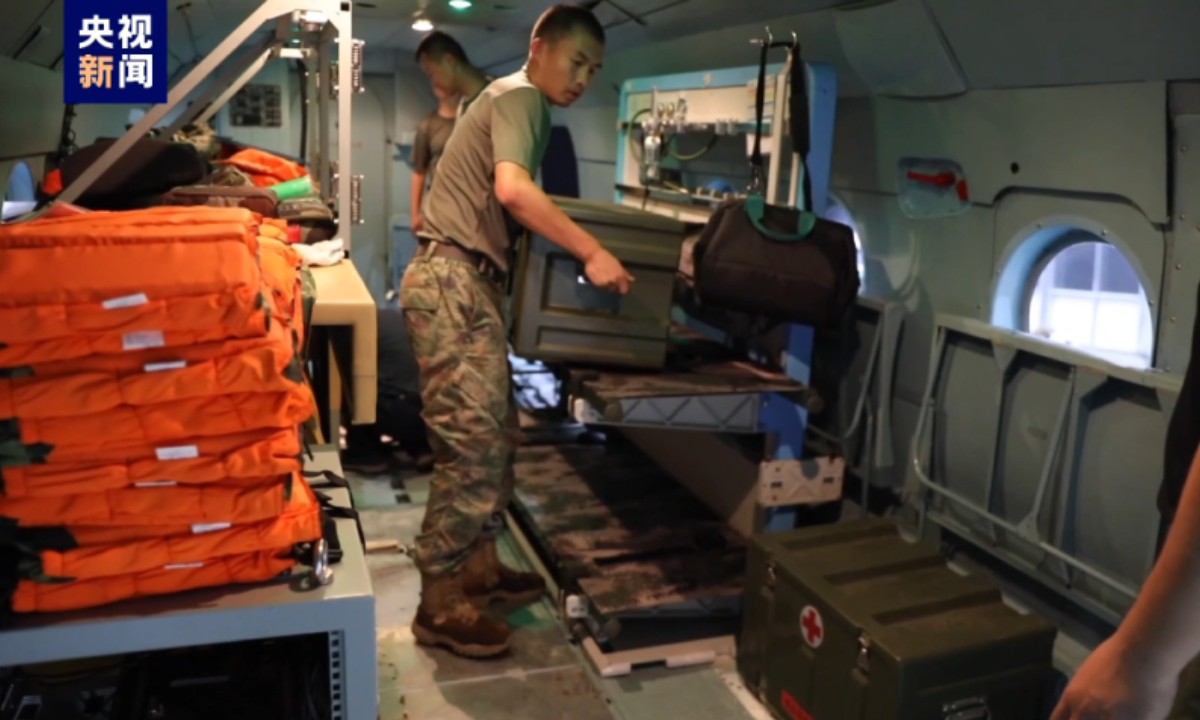
Four PLA ground force helicopters airdropped a total of 1,900 relief supply packages to the stranded communities on August 1. 2023. Photo: CCTV
Beijing is intensifying efforts in disaster relief by employing helicopters to airdrop essential supplies and transfer stranded residents. The city is also collaborating with neighboring Tianjin Municipality and Hebei Province in flood control by discharging floodwaters into available reservoirs.
As of 6 am on Tuesday, 11 people have been killed by heavy rains and subsequent flooding in Beijing, including two who died in the line of duty, and another 27 people are missing, including four who disappeared while carrying out disaster relief work.
Three railway trains were left stranded due to complete transportation cut-off in some places caused by severe flooding around the Beijing districts of Fangshan and Mentougou on Monday.
On Tuesday morning, four PLA ground force helicopters airdropped a total of 1,900 relief supply packages to the stranded communities.
On Monday night, a brigade under the PLA 81st Group Army completed material loading and flight preparation overnight and converted transport helicopters to install medical equipment, including monitoring devices, stretchers and oxygen suppliers, to facilitate the transfer of wounded individuals.
According to Liu Dong, an official from the brigade, they spent one day carrying out an inspection of the helicopters to ensure they could be properly outfitted to complete their disaster relief mission.
Around 5 am on Tuesday, the four helicopters carried 26 PLA soldiers and flew to Yanhecheng Railway Station in Mentougou and other locations to distribute relief supplies and transfer patients. Based on the weather conditions, supplies were either airdropped or handed out by PLA personnel on the ground.
A total of 1,900 food packages, 900 raincoats, 700 blankets and other emergency supplies were sent in batches to stranded residents.
The personnel stranded on train K1178 were left waiting at Yanhecheng Railway Station, however, they were considered safe due to the location of the station, the Beijing Daily reported on Tuesday morning. The personnel stranded in the other two railways had been all transferred as of Monday afternoon, according to China Railway Beijing Group Co.
According to the Beijing flood control authority, a total of 52,384 at-risk residents had been transferred to safe locations as of 8 pm on Monday. Additionally, a total of 107 mountain roads and 301 mountain flood channels had been closed. Twelve districts in Beijing will continue to remain on red alert for flooding on Tuesday as rainstorms are expected to persist across Fangshan, Mentougou, Yanqing and Changping districts.
China's State Flood Control and Drought Relief Headquarters consulted with China's Ministry of Emergency Management, China Meteorological Administration and China's Ministry of Water Resources on Monday evening, issuing a forecast that heavy rains and storms would continue across Beijing, Tianjin, and the middle, southern and northeastern parts of Hebei, with the flooding disasters further intensifying in these areas.
The water resource departments in Beijing, Tianjin and Hebei have cooperated in executing flood control, adopting measures such as pre-discharge of floodwaters and coordinating upstream and downstream to minimize the overall impact of flooding across the region.
Beijing for the first time used the Beijing Zhaitang Reservoir built in 1998 to pre-discharge floodwaters on Sunday before diverting runoff to the reservoir on Monday, maximizing the effect of flood control.
Huairou Reservoir also began flood discharge on Monday afternoon. In the early hours of Tuesday, its maximum downward flow was more than four times the average amount recorded in previous years.
Global Times




